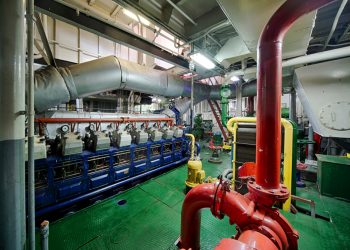ICS says that IMO global sulphur cap will have profound impact on shipping economics and examines how critical decisions is the mandatory global use of low sulphur fuels.
The IMO Marine Environment Protection Committee (MEPC) is expected to take a critical decision that will have profound implications for the economics of shipping, in October 2016. This is the decision on whether or not to implement the global cap on the sulphur content of marine fuel on 1 January 2020 or to postpone until 2025 – i.e. the requirement under Annex VI of the MARPOL Convention, adopted in 2009, for all ships trading outside sulphur Emission Control Areas (ECAs) to use fuel with a sulphur content of 0.5% or lower.
The decision will be highly significant because the cost of compliant low sulphur fuel is likely to be well over 50% more than the cost of residual fuel. Residual fuel is what most ships currently burn outside of the ECAs, which came into force in North America and North West Europe in January 2015, in which fuel with a sulphur content of 0.1% or less must be used. (It is expected that further sulphur ECAs will be established by China before 2020.)
If the global cap is implemented in 2020, and fuel costs stay at the current low levels which have applied since the dramatic fall in oil prices during 2015, a mandatory switch to low sulphur fuel would mean that bunker costs would return to their 2014 peak. But if by 2020, as some predict, oil prices increase to something approaching US$ 70 a barrel (still well short of the peak in 2014) it has been estimated that the differential between compliant and residual fuel could spike by as much as US$ 400 a tonne.
Under the terms of the MARPOL Convention, IMO is obliged to conduct a study into the availability of compliant low sulphur in order to allow Member States to decide whether the global cap should indeed be implemented in 2020. This fuel availability study is now scheduled to be presented to the MEPC in advance of its meeting in October 2016.
In reality the decision taken by IMO is likely to be a political one. Although the cap will apply in the middle of the ocean, where very few people live, it was adopted by IMO Member States in order to reduce risks to human health and to improve the marine environment (sulphur being a cause of ocean acidification). Even if the supply of compliant fuel is projected to be tight, IMO Member States might nevertheless conclude that it is politically unacceptable to postpone implementation.
The European Union has already agreed that the 0.5% sulphur requirement will apply in 2020 within 200 miles of EU Member States’ coasts, regardless of what IMO decides (with EU Member States also having territory in the Atlantic, Pacific and Indian Oceans, around which it is assumed that the EU standard will also apply). In theory, if the IMO global cap was postponed this would create a narrow corridor along the coast of North Africa in which the use of cheaper fuel would still be acceptable, while elsewhere in the Mediterranean it would not, a situation which EU Member States at IMO might find difficult to accept.
The IMO decision is meant to focus on the availability of compliant fuel, rather than taking account of the purchase price. While it is likely that oil refiners will be unable to supply sufficient quantities of 0.5% fuel produced especially for marine use before 2020, it seems likely that other more expensive fuels, such as 0.1% sulphur distillate, would be available, although this may well have a negative impact on the supply of diesel for shore based industries.
Whatever date is decided by IMO, ship operators and oil refiners will require as much time as possible to prepare for implementation. The oil refining industry will need to take important decisions to ensure that sufficient quantities of compliant fuel will be available. Shipowners will need to take important decisions about whether to invest in alternative compliance mechanisms such as exhaust gas cleaning systems (‘scrubbers’) or the use of low sulphur fuels such as LNG. The date of implementation of the 0.5% sulphur cap may also affect decisions on whether or not ships will be sent for early recycling.
In view of the economic impact that the implementation date of the 0.5% sulphur cap will have on international shipping, and the decisions that need to be taken by oil refiners and shipping companies worldwide, ICS and Intertanko made a submission to the meeting of the MEPC in April 2016. This requested that IMO should take a clear decision about whether or not implementation will take plac e in 2020, and that this decision should be made in October 2016.
e in 2020, and that this decision should be made in October 2016.
In the event that 2020 is the implementation date for the global cap, it will be vital for IMO Member States to start addressing issues associated with compliance and enforcement in order to ensure fair competition and the maintenance of a level playing field.
Contrary to the fears of some, experience with the initial implementation of the sulphur ECAs since January 2015 suggests that there is little evidence of deliberate non-compliance by ship operators (although occasionally there have been some technical problems associated with the fuel switchover or the specification of fuels provided by some bunker suppliers). But the sound implementation of a worldwide sulphur cap will present a much more complex challenge than the ECA requirements. In view of the potential for serious market distortion it will be vital for IMO to begin addressing this quickly.
Source & Image credits:ICS





























































